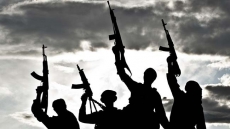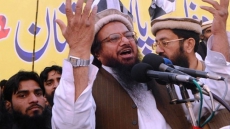With growing global pressure to rein in militant group’s functioning on its soil, Pakistan’s Interior ministry said its security agencies had detained 44 members of banned groups, including Jaish-e-Mohammed chief Masood Azhar’s brother Mufti Abdur Rauf.
Indian security agencies were unmoved by reports of arrest, with officials saying the terrorists were not arrested under the anti-terrorism laws but have only been taken in “preventive detention for investigation”.
Mufti Abdur Rauf, brother of Azhar, and Hammad Azhar are among those arrested during the crackdown, Minister of State for Interior Shehryar Khan Afridi said at a press conference.
He said a dossier shared by India with Pakistan last week also contained names of Mufti Abdur Rauf and Hammad Azhar.
The minister said the action would be taken against all the proscribed organizations, but denied that the action came in the light of intense pressure.
The move came a day after Pakistan on Monday promulgated a law to streamline the procedure for the implementation of the UN sanctions against individuals and organisations.
Interpreting the order, Foreign Office spokesperson Mohammad Faisal said it means that the government has taken over the control of assets and properties of all banned outfits operating in the country.
The development comes in the face of intense pressure to deal with militant organisations that operated in the country, including the JeM, which claimed a recent suicide attack in Pulwama that killed 40 troopers of the Central Reserve Police Forces. The attack sparked outrage in India, and escalated tensions between India and Pakistan.
With growing global pressure to rein in militant group’s functioning on its soil, Pakistan’s Interior ministry said its security agencies had detained 44 members of banned groups, including Jaish-e-Mohammed chief Masood Azhar’s brother Mufti Abdur Rauf.
Mufti Abdur Rauf, brother of Azhar, and Hammad Azhar are among those arrested during the crackdown, Minister of State for Interior Shehryar Khan Afridi said at a press conference.
He said a dossier shared by India with Pakistan last week also contained names of Mufti Abdur Rauf and Hammad Azhar.
The minister said the action would be taken against all the proscribed organizations, but denied that the action came in the light of intense pressure.
The move came a day after Pakistan on Monday promulgated a law to streamline the procedure for the implementation of the UN sanctions against individuals and organisations.
Interpreting the order, Foreign Office spokesperson Mohammad Faisal said it means that the government has taken over the control of assets and properties of all banned outfits operating in the country.
The development comes in the face of intense pressure to deal with militant organisations that operated in the country, including the JeM, which claimed a recent suicide attack in Pulwama that killed 40 troopers of the Central Reserve Police Forces. The attack sparked outrage in India, and escalated tensions between India and Pakistan.
Similar actions by the neighbouring country against leaders of the proscribed outfits in the past turned out to be farce as those who were taken into custody were let off soon on different pretexts.
There is every possibility that the detention could also be an attempt by the Pakistan Army to provide security to these terrorists, given the “fear psychosis” that has gripped Pakistan in the past few days following the Indian Air Force strike at Balakot, an Indian official said.
The assessment of the security agencies came in view of the fact that founders of Jaish-e-Mohammad and Lashkar-e-Taiba—Masood Azhar and Hafiz Saeed, respectively—were detained several times in the past, mostly under laws that provide for detention for apprehension of “breach of peace”.
Azhar and Saeed have never been prosecuted under the Pakistan’s Anti Terrorism Act, 1997, another official said.


